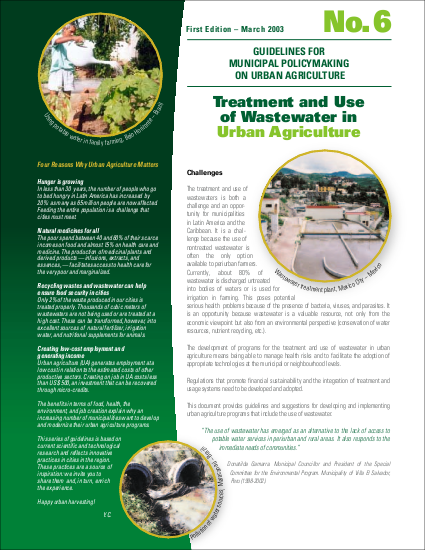
The treatment and use of wastewaters is both a challenge and an opportunity for municipalities in Latin America and the Caribbean. It is a challenge because the use of nontreated wastewater is often the only option available to periurban farmers. Currently, about 80% of wastewater is discharged untreated into bodies of waters or is used for irrigation in farming. This poses potential serious health problems because of the presence of bacteria, viruses, and parasites. It is an opportunity because wastewater is a valuable resource, not only from the economic viewpoint but also from an environmental perspective (conservation of water resources, nutrient recycling, etc.). The development of programs for the treatment and use of wastewater in urban agriculture means being able to manage health risks and to facilitate the adoption of appropriate technologies at the municipal or neighbourhood levels. Regulations that promote financial sustainability and the integration of treatment and usage systems need to be developed and adopted. This document provides guidelines and suggestions for developing and implementing urban agriculture programs that include the use of wastewater.
Resource collections
- Evaluating humanitarian action
- UN Habitat - Urban Response Collection
- Urban Response - Urban Crisis Preparedness and Risk Reduction
- Urban Response Collection - Community Engagement and Social Cohesion
- Urban Response Collection - Economic Recovery
- Urban Response Collection - Environment and Climate Change
- Urban Response Collection - Housing, Land and Property
- Urban Response Collection - Urban Crisis Response, Recovery and Reconstruction
- Urban Response Collection - Urban Resilience